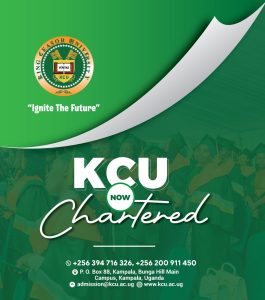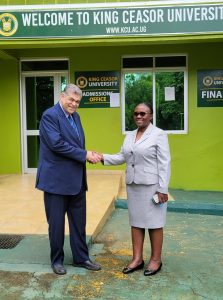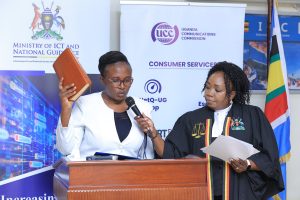
E-Resouces Lab
Welcome to a new era of digital learning and research! Our state-of-the-art E-Resources Lab is designed to empower students, researchers, and professionals with the latest technology, high-speed internet and premium digital resources at their fingertips
Expansive book collections
Our well-equipped library is the heart of learning at KCU. Whether you’re a student, researcher, or book enthusiast, our extensive collection will inspire and empower you.
Library Week
Be part of our exciting Library Week as we guide you on how to efficiently utilize library resources for research, learning, and academic success
Message from the University Librarian
Our Core Values

Mr. Eric Keziron Oloo
University Librarian
Welcome to King Ceasor University (KCU) Library, a knowledge hub and home to the best study spots on campus. Our theme is; an automated and user-centered academic library services: A catalyst to academic excellence, research, and innovation. Thus, the library offers a multifaceted resources and services accessible both physically and remotely in support of the academic mission of the University.
The library also fosters collaboration with different KCU schools and departments in building a strong and relevant collections. In addition, KCU Library subscribes to the Consortium of Uganda University Libraries (CUUL) for effective and efficient collaboration and resource sharing among university and institutional libraries in Uganda, which ensures access to, and use of state-of-the-art library resources and services. Please don’t hesitate to seek support from our librarians at all times. We shall always offer you professional library and information services, moreover with a smile
Equity:
We recognize and address the unique needs of our users to ensure they have an equal opportunity for academic excellence.
Integrity:
We ensure moral soundness and uphold intellectual honesty and ethical use of information.
Innovation:
We continuously seek new and creative ways to enhance library services and resources.
Learning:
We provide relevant resources to support teaching, learning, and research.
Accountability:
We ensure that all resources entrusted to the library are used efficiently, effectively and responsibly to achieve its purpose.
Who we are
Mission
To embrace emerging technologies and best practices in the provision of exceptional library and information services.
Vision
An indispensable research, innovation and knowledge hub.
Library Hours
Mon – Fri: 7:30 AM – 09:00 PM
Sat: 8:00 AM – 1:00 PM
Public Holidays:(Closed except on special arrangements)
Latest Arrivals
💻👏 Our students proudly represented KCU in the Cyber Security Competition held on 4th November,where we performed exceptionally well and several individual awards were won!
— King Ceasor University (@KingCeasorUni) November 6, 2025
A big congratulations to our brilliant team! 🔐🎉#KCU #CyberSecurity #Excellence #Innovation pic.twitter.com/j3gkrP5mq5
Huge congratulations to the KCU team for emerging winners of the Catch the Flag competition at the EastCon Cybersecurity Symposium 2025! Proud moment for KCU! 👏🎉#KCU #CyberSecurity #EastCon2025 pic.twitter.com/nmItImerXl
— King Ceasor University (@KingCeasorUni) October 28, 2025
Latest news
How to access E-resouces remotely
- Download the MyLoft app from Playstore for android users or Appstore for iOS
- For Computers, install MyLoft extension in google chrome
- Under insitutuions, select Consortium of Uganda University Libraries, Uganda
- Login using the credentials received from the library
Frequently asked questions
How do i enroll for library services?
Visit the library reception to create an account and access library resources both on and off campus.
How do i access the library catalogue?
To access the university library catalogue, visit Library Catalogue


